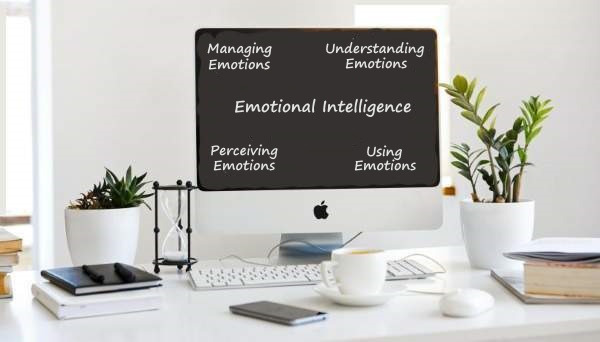10 Traits and Habits of Emotionally Intelligent People
Emotionally intelligent people possess many traits and habits, including strong self-awareness, recognition of their emotions, and how these feelings and emotions influence their thoughts and behaviors. This awareness enables them to manage their emotions effectively, leading to calmness even in stressful situations.
Z. Hereford


There are ten discernible traits and habits of emotionally intelligent people that we can all observe, learn, and acquire to boost our emotional intelligence.
Luckily for the rest of us, we can ascertain that emotionally intelligent people practice various habits and behaviors that help them understand and manage their emotions.
Moreover, they are keenly aware of their own feelings and emotions and understand those of others.
To recap from a previous article, Emotional Intelligence, or EI, is the ability to perceive, assess, and manage one's emotions, as well as the emotions of others. Included in that ability are these four significant capacities:
➔ Accurately perceive emotions in oneself and others
➔ Use emotions to reason and think clearly
➔ Understand emotional meanings
➔ Manage emotions
Here are some key traits and habits of emotionally intelligent people. Study and incorporate them into your life and habits to live more fully and deliberately.
10 Traits and Habits of Emotionally Intelligent People:
1. They are aware of and pay attention to their feelings and emotions. According to psychologist Dr. John Mayer, one of the co-developers of the four-branch emotional intelligence model along with Dr. Peter Salovey:
"Emotional intelligence is the ability to perceive emotions; to access and generate emotions so as to assist thought; to understand emotions and emotional knowledge; and to reflectively regulate emotions so as to promote emotional and intellectual growth."
In other words, emotionally intelligent people are self-aware. They understand their feelings and emotions and how they affect and influence others.
2. They develop the habit of regulating their feelings and emotions. Emotionally intelligent people have learned that emotions can be fleeting, unpredictable, and sometimes unreliable, so they know not to act upon them immediately. Instead, they pause, think about what is transpiring, and only then act accordingly. The saying "think before you act" is an example of such control.
3. They learn from their "emotional" mistakes. When we become angry, we react against the best interests of ourselves and others. We allow our emotional state to dictate our behaviors instead of rationally approaching a situation. Emotionally intelligent people study their behaviors and identify their triggers. They learn to adopt habits that keep their emotions and feelings balanced.
4. They are good listeners. Listening is one of the most important social skills in emotional intelligence. It not only demonstrates awareness of self and the other person but also shows concern for what the person is saying. Such an exchange builds rapport and a connection for comfortable, honest communication.
5. Are Open-Minded. Emotionally intelligent people learn to be open-minded. They aspire to grow socially and intellectually by meeting new people and having new experiences. They are equally open to new ideas and alternative ways of seeing things.
6. They learn to live in the moment. Dwelling on the past or worrying about the future is counterproductive. The only way to appreciate and experience the moment is to develop the habit of staying present. Emotionally intelligent people understand this concept, so they train themselves to be aware of and participate in what is happening now.
7. They have acquired adaptability. Adaptability means being flexible, accepting change, and readily adjusting to different situations. It is similar to open-mindedness. We all know that nothing stays the same. Emotionally intelligent people understand that and learn to adapt to variable circumstances in an ever-changing world.
8. Are even-tempered. Because they have exceptional control of their emotions, those with high EI keep their cool and rarely lose their tempers. They are easy to get along with, make great teammates, and project a calm, confident presence. Who wouldn't want to emulate such a person?
9. Have learned to develop empathy for others. Emotionally intelligent people understand and care about what another person is going through. They are supportive and insightful, which allows them to develop deeper, more meaningful relationships. They build connections to others that would only be attainable with the quality of empathy.
10. Know when they are getting too comfortable. Most of us understand that staying in our comfort zones does not promote personal growth. Individuals with a high EI recognize when they are holding on to comfortable habits and when it's time to change things.
Possessing emotional intelligence improves the quality of our lives. High EI people are also less likely to engage in destructive behaviors such as substance abuse, impulsive actions, or violence. Instead, they enjoy healthy relationships, positive social interactions, satisfying careers, and overall personal fulfillment.
Equally important, those with a high EI are skilled at reasoning about emotional issues and can effectively use emotional information to solve problems and achieve goals.
